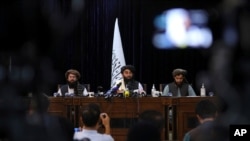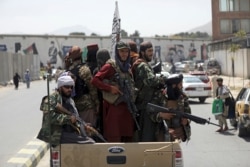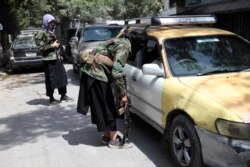The Taliban may discover that retaking Afghanistan may prove an easier task than ruling it.
That will depend, though, on how pragmatic and inclusive the Islamist militants are willing to be, say current and former diplomats, because they will need to compromise to secure buy-in from local power brokers, tribal elders and ethnic-minority leaders to maintain order.
Most of the attention now on Afghanistan is focused on the high-stakes and poignant drama playing out at Kabul airport, where thousands of desperate Afghans are seeking to flee the country fearing what Taliban rule will mean for them.
But after the final withdrawal of U.S.-led Western forces likely August 31, the date earmarked by President Joe Biden, the Afghans will be left alone and the Taliban will have their second shot at governing the notoriously fractious country, which since 1973 has known little but strife and civil war. “One way or another, the Taliban are likely to find governing Afghanistan to be far more difficult than conquering it,” according to Carter Malkasian, a former senior Pentagon adviser.
Writing in Foreign Affairs magazine, Malkasian says the Taliban’s victory doesn’t mean “an end to Afghanistan’s 40 years of war, uncertainty, and trauma.” He adds: “The Taliban face the poverty, internal strife, illicit crops, meddlesome neighbors, and threat of insurrections that are endemic to their country—and have proven the bane of all its rulers.”
Challenges ahead
The militants face the challenge of turning from insurgency to governing and will have to set up national governing institutions virtually from scratch. And they will have to revamp a disintegrated bureaucracy to oversee a country comprising at least 14 different ethnic groups with a total population of 38 million.
And their opponents say it will be a tall order for the Taliban to maintain control, pointing out that the militant’s movement only has a small fighting force of 75,000 to impose its will.
That was a sufficient number to retake the country, except for the Panjshir Valley, thanks to a host of surrender pacts the Taliban struck with others and a stealthy infiltration military strategy that allowed them to seize control of towns and cities, including the Afghan capital Kabul. At the start of the revolutionary year of 1917 in Russia, the Bolsheviks only had 24,000 party members, but that did not stop them seizing power and ruling a much larger Russia until the Soviet hammer and sickle flag was lowered for the final time over the Kremlin in 1991.
“We don’t know what to expect,” says Vali Nasr, a professor at Johns Hopkins University School of Advanced International Studies, a research institution in Washington. “First of all, there is a question whether this is the same Taliban,” he said during an online discussion hosted last week by the Asia Society, a global non-profit.
Nasr, a former senior advisor to the U.S. State Department on Afghanistan, suspects it might be a different Taliban. “I think there are big differences,” he added.
He highlighted how the Taliban moved through the country swiftly with few major battles because they engaged politically with others in ways they did not when conquering Afghanistan in the 1990s, which was accompanied by massacres and unrestrained ferocity. That engagement started in earnest more than two years ago, note other Afghanistan country experts, with behind-the-scenes outreach to ethnic minorities by the group led by the Taliban’s network of “shadow” governors.
In 1998 after occupying the city of Mazar-e-Sharif Afghanistan’s fourth largest city, the Taliban slaughtered at least 2,000 civilians, most of them ethnic Hazaras, who are Shi’ite Muslims and are considered by the Sunni-favoring Taliban as not true Muslims. The newly installed governor threatened Hazaras with death unless they converted to Sunni Islam and hundreds fled the city along with Shi’ite militiamen under bombardment.
A kinder, gentler Taliban?
Last week, in a notable difference, the Taliban did not interfere with Afghan Shiites observing Ashura, which is celebrated by all Muslims but for Shiites is a major religious commemoration of the martyrdom of Hussein ibn Ali, a grandson of the Prophet Muhammad. The killing of Hussein in 680 AD led to the split in Islam between Sunnis and Shias.
Several Taliban officials visited an Hazara neighborhood in Kabul to attend the Shiites’ celebration. And last week Taliban leaders held talks with Hazara leaders about how to form an inclusive government to govern Afghanistan.
Since arriving in Kabul, the Taliban has been holding meetings with politicians and others, including former President Hamid Karzai and Abdullah Abdullah, chairman of Afghanistan’s National Reconciliation Council, a body of notables and elders, over the makeup of a new government.
But is this all for show? Some Taliban opponents and country experts believe the Taliban are biding their time until they have consolidated power and are eager to keep foreign aid flowing and to secure the $9.5 billion in Afghanistan reserves currently lodged overseas.
The Taliban leadership has dialed down its criticism of the West. “Anti-international rhetoric has been a rallying call in the past, but the Taliban leadership knows its chance of making any success of government depends on international donors. Despite a stunning success in one of the most sophisticated resurgent insurgencies in the world, and morale being high among Taliban fighters and field commanders, Afghanistan’s economic woes are extensive,” notes Chatham House’s Hameed Hakimi in a recent commentary.
Ali Nazari, a spokesman for Ahmad Massoud, who is leading a nascent anti-Taliban resistance movement in the Panjshir Valley, believes the political negotiations are a ruse — as are Taliban pledges to allow girls an education and women to work.
“The Taliban might be more sophisticated now and slicker in how they present themselves to the world, but they are even more radical than before,” he told VOA. “Their reign of terror hasn’t started. They’re waiting for Americans and Europeans to leave Afghanistan,” he told VOA in a phone call from an undisclosed location.
Nazari and other Taliban opponents fear it won’t be long before the Taliban start up tribunals to apportion revolutionary justice and punish those who worked with Western security forces.
Reported abuses
Others point to the mounting allegations of brutality and killings across the country and of Taliban manhunts in Kabul and elsewhere for Afghans who worked alongside Western security forces the past two decades. A Norway-based private intelligence group that provides information to the U.N. said this week it had obtained evidence that the Taliban have rounded up Afghans on a blacklist of people they believe worked in key roles with the previous Afghan administration or with U.S.-led forces.
And while Taliban leaders have been formally courting Hazara elders, Amnesty International has reported that Taliban fighters massacred nine ethnic Hazara men after taking control of Afghanistan’s Ghazni province last month.
The rights group says the killings took place in early July in the village of Mundarakht, Malistan district. Basing its report on eyewitness accounts, Amnesty says six of the men were shot and three were tortured to death, including one man who was strangled with his own scarf and had his arm muscles sliced off.
Amnesty fears the slaughter may represent a tiny fraction of the total death toll inflicted by the Taliban to date, as the group has cut mobile phone service in many places they control, preventing photographs and videos to be shared. “The cold-blooded brutality of these killings is a reminder of the Taliban’s past record, and a horrifying indicator of what Taliban rule may bring,” says Agnes Callamard, the secretary general of Amnesty International.
The U.N. human rights chief Michelle Bachelet warned Tuesday that she had received credible reports of severe abuses in areas under Taliban control in Afghanistan, including “summary executions” of civilians and security forces who had laid down their arms and restrictions on women.
Whether the reports of killings and manhunts as well as beatings of youngsters who offend Taliban fighters because of how they’re dressed are all signs of the direction of Taliban travel or should be put down as the actions of especially fervent individual fighters or commanders is unclear. Taliban promises of inclusivity and of a softer rule and offers of concession aren’t persuading some observers.
“Over time, Taliban leaders will have little reason not to use their military power to consolidate and monopolize control,” reckons former Pentagon adviser Malkasian. And that risks pushback from tribes and minority groups.
Some information for this report came from the Associated Press.






